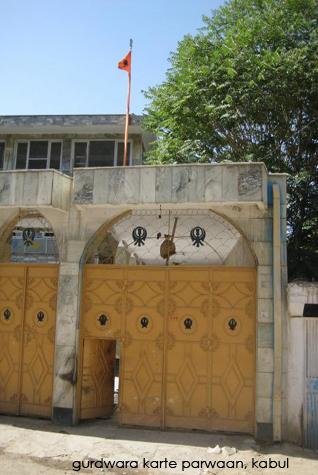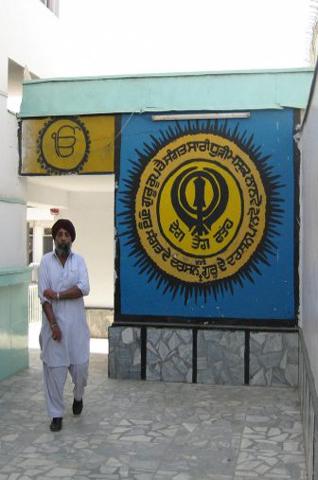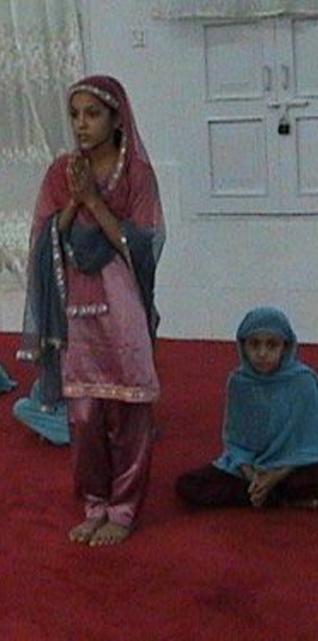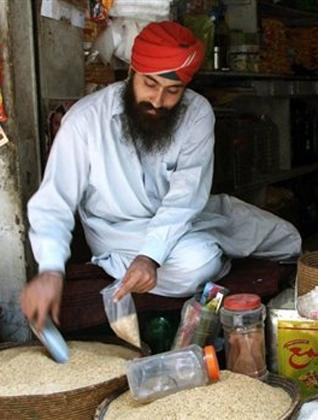Travel
An Oasis in Every Wilderness
by JASTEENA KAUR DHILLON
My travels have taken me all over the world and exposed me to many fascinating people and amazing sights - whether it be the precious birthplace of three religions in Israel/ Palestine, the crossroads of cultures in the Balkans or my very own Punjab.
They are all different and unexpected and pleasantly surprising. But what I always want to find as my anchor point when I set foot on the ground is where the local gurdwara is, where my fellow faithful go to get their blessings, do their community service and contemplate their lives.
Every war zone, disaster-struck and developing country I have worked in - from Sudan to Iraq to Indonesia to Afghanistan - I have sought out and found a thriving gurdwara. And they are all the same: majestic, open and peaceful.
Even in the coldest months in Kabul, the gurdwara felt warm and inviting, full of sincerity and serenity.
This is an oasis in each of these chaotic and unpredictable cities where I can go to be who I am, to understand why I am here and to confirm what I am doing. And I know once I have made the connection to the gurdwara, I will never be alone anywhere I am.
The other day, I was struggling to carry my bag into Kabul airport - which is a long and painful walk through treacherous paths, muddy and wet in winter, as it is right now - C-C-OLD! As I was stopped every 50 metres by a checkpoint or luggage check, "due to security reasons"- the airport official kept assuring me - I became angrier and more bitter. Why is this such a struggle, I asked myself. Why does the world's fear and ignorance create an atmosphere where these kinds of humiliating searches and intrusions have become the norm?
Just then, I noticed an elderly Sikh man who was sitting in the dismal cold entry-way to the terminal. Just as I was cursing myself aloud for deciding to wear the cotton kameez and new leather boots on what seemed like the coldest snowy day in history, the man approached me, offered his hand to take my bag and said, "Sat Sri Akal."
Was it the familiar words or the smile on his face or my relief that made me shed all of the tension and frustration that had built in me as I attempted to enter the airport, not sure, but the negative feelings were suddenly gone.
It turned out that he had recognized me from the gurdwara in Karte Parwaan (a neighbourhood in Kabul) and we began to share thoughts about the sermon and moved on to speak about things like the sun that had shone extra brightly that day, about his family (who worked as bricklayers), who he was grateful were surviving well, and about my family who I was about to see the next day. And then, just like that, I was at the check in counter and the chaos and confusion re-emerged, I got side-tracked and when I turned back, he was gone.
What was that? A ghost, a guardian angel, a good Samaritan? Whatever it was, my mood was changed. I had a bittersweet feeling of maybe not leaving Afghanistan on that day, but going back to the gurdwara to find him and thank him, flooded over me. This serene bubble I was in burst as soon as I reached the next security check, I forgot the Sikh gentleman and I was anxious to get out of the chaotic airport again.
This brief meeting with my fellow Sikh gave me comfort and then turned into horror as I suddenly thought of what he was doing here.
At the time of the fall of the Taliban, there were about 1500 Sikhs living all over Afghanistan and were unable to leave because they lacked travel documents. All of them took refuge in the gurdwaras that are dotted all over the country. The Sikhs who are in Afghanistan are amongst those who went to Afghanistan centuries ago as traders and businessmen. Until the Soviet invasion, the Sikh community was more or less prosperous, but after the Soviets and during the mujahedeen conflict of the 1980s and the Taliban rule, Sikhs continued to suffer financially and physically.
At the time of the Taliban and the invasion by the Americans, only wealthy Sikhs managed to flee, the less privileged members of the community had to remain.
However, this was all but impossible for the less privileged members of the Sikh community. Some of the problems faced by these Sikhs included lack of travel documents, invalid or expired passports and no financial resources to fund their travel out of Afghanistan. And since there was no Indian diplomatic mission in Afghanistan during the Taliban, it was impossible to get passports or visas issued.
The Sikhs I spoke to after this meeting about their existence in Afghanistan told me that they were grateful that they had the gurdwara to go to in these times of violence, chaos and conflict and it had protected them, fed them and kept them warm. This is so true and I feel it each time I discover where the gurdwara is in the place I am coming to work. And it is that way for those Sikhs who are suffering in the midst of someone else's war as it is for me that we can go to there and feel safe and warm and nutured and calm.
It is a place that I can go to find that serenity that I am then able to make a connection between me and this seemingly new and distant place that I find myself working in or studying, whether it is Sri Lanka or Bosnia or Somalia. The moment I make that connection with the gurdwara or the Sikh community or any quiet place of worship a church in a village in Sudan or Bosnia, a Buddhist temple in Nepal or Sri Lanka, or a mosque in Indonesia or Afghanistan, I feel all hopelessness of my task dissipates and the way forward appears.
This is the great thing about finding the "gurdwara" everywhere I go to find home in a strange place and I hope it was the same for my fellow Sikhs in Afghanistan.
[Jasteena Kaur Dhillon is a Sikh-Canadian/ Briton who is currently engaged by Harvard University in their State-Building and Human Rights for Afghanistan/ Pakistan/ South Asia program as a research fellow looking at issues of rule of law, formal and informal justice in the context of human rights in the tribal areas. Her overall research and advocacy research interests centre on international law, justice and human rights in conflict, post-conflict and transitional countries and regions.
Jasteena is a graduate of University of Toronto and the University of Windsor Law School and holds a Master's in International Law from Leiden University in the Netherlands. She worked in Canada in the community development and advocacy sector on issues such as violence against women movement and discrimination against immigrants and refugees from 1989 till 1999. She started as a Student Activist in the South Asian student movement in the University in Toronto and continued after graduation as a Community Advocate and Counsellor at Toronto area women's shelters and crisis centres for rape victims and youth.
After leaving Toronto in 1990s to work on children's rights issues in the context of the South African constitutional process, she continued to work globally on international legal and development issues in conflict, post-conflict and transitional crisis areas around the world, including in Afghanistan, Southern Sudan, Iraq, Sri Lanka, Indonesia, Bosnia, Croatia, Occupied Palestinian Territory, South Africa and India in international non-governmental organizations, the United Nations and North Atlantic Treaty Organization.
She has worked specifically on rights and development for women, children, refugees, IDPs in conflict and post-conflict settings, with a special emphasis on issues ranging from development of rule of law institutions and governance, the role of customary and sharia legal systems, human rights and humanitarian law , duties and responsibilities of national and international actors in building judicial and political institutions and civil-military interaction strategy and tools in the evolution of states and regions from crises to stability.]
March 11, 2010
Conversation about this article
1: I.J. Singh (New York, U.S.A.), March 11, 2010, 10:48 AM.
A fantastic and moving account. Nice to know how young Sikh women are engaged in the world - true to the message of Sikhi. Would love more vignettes from your life on such matters, Jasteena. Please do share more such events and stories.
2: Aryeh Leib (Israel), March 11, 2010, 1:07 PM.
Where exactly did you find so much as a Sikh/Sikhni, let alone an entire gurdwara, in Israel?
3: Inni Kaur (Fairfield, CT, U.S.A.), March 11, 2010, 4:59 PM.
Jasteena Kaur, you are a trail blazer. Do keep sharing with us your travels. Please take all the necessary safety precautions. Guru Raakha!
4: Manbir Singh Banwait (Fort McMurray, Alberta, Canada), March 12, 2010, 5:51 AM.
To Aryeh Leib: There are two gurdwaras in Israel - in Tel Aviv and Eilat. Off the top of my head, I cannot remember the addresses, but I have been there. Also, my father flew for the Israelis during the 1967 Six-Day War - a turbaned Sikh in an Israeli Air Force uniform! In the Gaza strip at an old commonwealth graveyard, Sikh headstones are still visible from WW1. Towards the Shaeba Farms, you will almost always see Sikh troops with the UN force there.
5: Harman (Amritsar, Punjab), March 12, 2010, 12:01 PM.
May Waheguru bless these Sikhs of Afghanistan and Pakistan with Chardi kalaa!
6: Gurjender Singh (Maryland, U.S.A.), March 12, 2010, 1:47 PM.
I salute the Sikhs of Afghanistan and Pakistan, where it isn't very easy to maintain their Sikhi with turban, etc. But still, they are maintaining the Sikhi Faith. On the other hand, in India andr other places in the world where Sikhs have less problems, they are giving away their Sikhi ...
7: Sangat Singh (Kuala Lumpur, Malaysia), March 13, 2010, 5:27 AM.
It was the 'dastar' that invoked immediate kinship with Jasteena without any hesitation, ceremony or introduction. It is a common practice in Malaysia to greet any turbaned Sikh you pass, at least by raising a hand in greeting. This is so everywhere else, perhaps not so much in India. The turban also reminds us of the commitment and accountability to the Guru for this crown. The Punjabi saying: "Puggh di laaj rakh". In minutes, total strangers become brothers and sisters. Let me give you just one specific example. In 1979, as an Estate Manager, I was posted to an estate that had a big hectareage of tea. Wanting to acquaint myself of the latest techniques, I decided to visit some tea estates near Ooty (South India). To do so the best way is to go to the Tea Planters Association where I was shown a list of the surrounding estates that I might wish to visit. I noticed on the list an estate whose manager was Amrik Singh Gill. At once I said that I knew this man and would like to visit his estate. I was lucky as it so happened S. Amrik Singh was there, just 10 yards away attending a committee meeting in the Club House. When he was informed of me, his immediately reply was, "Don't let this man out of sight, I'll be out in 10 minutes!" We met for the first time but as long lost brothers. He insisted that I immediately check out of the hotel and stay with him, which I did gratefully. That was the beginning of our friendship. The following year I took my family to visit them. This time there was even a greater surprise. As we entered Amrik's bunaglow, his wife Raj saw my wife and momentarily wrinkled her forehead, and said "Wait a minute!" and came out with a group photograph that had Raj and my wife Upkar in it. This photograph was taken in 1952 when both were students in Government College for Women, Ludhiana. Today we are still the closest of friends, thanks to the turban.
8: Rupi Mangat (Nairobi, Kenya), March 15, 2010, 5:11 AM.
Jasteena - this is a beautiful article. As a travel writer in Kenya, l took a bus ride across the Ruwanzori strip in Uganda and landed at Fort Portal on a rainy afternoon. This little town had a large Sikh community thriving since the early 1900s but after Idi Amin's terrible reign in the 1970s, all left. The Sri Guru Singh Sabha is still there and looked after by some Sikh caretakers, now that peace has returned. I felt the same way when l was told of the gurdwara and visited it.
9: Aryeh Leib (Israel), March 15, 2010, 3:47 PM.
To Manbir Dingh Banwait: This is certainly news to me! If these gurdwaras indeed exist, they seem to be a closely guarded secret. I couldn't find any internet listings for them, and I don't think I'll ask the Indian Consulate, either. If you can find the addresses - especially for Tel Aviv - I'd be grateful.
10: S.S.N. (United States), March 15, 2010, 8:55 PM.
The article and the author herself share some interesting insights. But even more so, the comment section is worth reading. It is another book of knowledge in itself!
11: Mandeep Chawla (Israel), February 25, 2011, 10:11 AM.
I would like to attend the gurdwara in Israel. Does anyone know its location or address? [Editor: You may wish to check with www.SaraiBooking.com and see if they can help.]
12: Akiva Atwood (Jerusalem, Israel), July 31, 2011, 1:26 PM.
Does anyone know more about the Gurdwara? I've contacted saraibooking.com and they don't have any information.
13: Swarn Singh Kahlon (Chandigarh, Punjab), January 01, 2012, 6:13 AM.
Jasteena ji: Let's collaborate and locate Sikhs in unknown places. This is my hobby and passion. Check out www.sikhglobalvillage.com and my new book on the Sikhs of Latin America.
14: Jaspal Singh (Delhi, India), June 18, 2013, 6:42 AM.
Hats off to Jasteena who has shared valuable moments of her experience, which have enabled us to know some more about Sikhs/gurdwaras in other parts of the world. With folded hands, I request: someone eligible/competent please come forward to help Sikhs who could not leave Afghanistan due to lack of finance and/or valid documents. I would also like to share, as far as possible at my level, monetary help for them. May Waheguru give us strength to help them.
15: Gurinder Singh (Stockton, California, U.S.A.), August 30, 2014, 7:54 AM.
I had stayed in Israel during my project assignment in 1995. I lived first at Netanya and then at Beer Sheva. I enjoyed my stay and had no problem there as a Sikh. I did visit Eilat and met one Sikh who told me that they were assembling for a Sikh gurdwara service weekly in each other's homes. Once during a visit to a market in Omar, a lady came to me and asked if I was a Sikh. She told me that she remembered seeing Sikh soldiers in Jerusalem in 1948.






